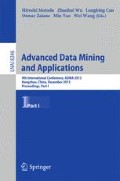Abstract
This work proposes a semi-sentiment classification method by exploiting co-occurrence opinion words. Our method is based on the observation that opinion words with similar sentiment have high possibility to co-occur with each other. We show co-occurrence opinion words are helpful for improving sentiment classification accuracy. We employ the co-training framework to conduct semi-supervised sentiment classification. Experimental results show that our proposed method has better performance than the Self-learning SVM method.
Access this chapter
Tax calculation will be finalised at checkout
Purchases are for personal use only
Preview
Unable to display preview. Download preview PDF.
References
Blum, A., Mitchell, T.: Combining labeled and unlabeled data with co-training. In: Proceedings of the Eleventh Annual Conference on Computational Learning Theory, COLT 1998, pp. 92–100. ACM, New York (1998), http://doi.acm.org/10.1145/279943.279962
Cortes, C., Vapnik, V.: Support-vector networks. Machine Learning 20(3), 273–297 (1995), http://dblp.uni-trier.de/db/journals/ml/ml20.html#CortesV95
Hatzivassiloglou, V., McKeown, K.R.: Predicting the semantic orientation of adjectives. In: Proceedings of the Eighth Conference on European Chapter of the Association for Computational Linguistics, EACL 1997, pp. 174–181. Association for Computational Linguistics, Stroudsburg (1997)
Lee, D., Jeong, O.R., Lee, S.G.: Opinion mining of customer feedback data on the web. In: Proceedings of the 2nd International Conference on Ubiquitous Information Management and Communication, ICUIMC 2008, pp. 230–235. ACM, New York (2008)
Li, S., Huang, C.-R., Zhou, G., Lee, S.Y.M.: Employing personal/impersonal views in supervised and semi-supervised sentiment classification. In: Proceedings of the 48th Annual Meeting of the Association for Computational Linguistics, ACL 2010, pp. 414–423. Association for Computational Linguistics, Stroudsburg (2010)
Li, S.: Sentiment classification using subjective and objective views. International Journal of Computer Applications 80(7), 30–34 (2013)
Li, S., Guan, Z., Tang, L., Chen, Z.: Exploiting consumer reviews for product feature ranking. J. Comput. Sci. Technol. 27(3), 635–649 (2012)
Li, S., Hao, J.: Spectral clustering-based semi-supervised sentiment classification. In: Zhou, S., Zhang, S., Karypis, G. (eds.) ADMA 2012. LNCS, vol. 7713, pp. 271–283. Springer, Heidelberg (2012)
Pang, B., Lee, L.: Opinion mining and sentiment analysis. Found. Trends Inf. Retr. 2(1-2), 1–135 (2008)
Pang, B., Lee, L., Vaithyanathan, S.: Thumbs up?: sentiment classification using machine learning techniques. In: Proceedings of the ACL 2002 Conference on Empirical Methods in Natural Language Processing, EMNLP 2002, vol. 10, pp. 79–86. Association for Computational Linguistics, Stroudsburg (2002)
Turney, P.D.: Thumbs up or thumbs down?: semantic orientation applied to unsupervised classification of reviews. In: Proceedings of the 40th Annual Meeting on Association for Computational Linguistics, ACL 2002, pp. 417–424. Association for Computational Linguistics, Stroudsburg (2002)
Turney, P.D., Littman, M.L.: Measuring praise and criticism: Inference of semantic orientation from association. ACM Trans. Inf. Syst. 21(4), 315–346 (2003)
Zhou, S., Chen, Q., Wang, X.: Active deep networks for semi-supervised sentiment classification. In: Proceedings of the 23rd International Conference on Computational Linguistics: Posters, COLING 2010, pp. 1515–1523. Association for Computational Linguistics, Stroudsburg (2010)
Author information
Authors and Affiliations
Editor information
Editors and Affiliations
Rights and permissions
Copyright information
© 2013 Springer-Verlag Berlin Heidelberg
About this paper
Cite this paper
Li, S., Hao, J., Jiang, Y., Jing, Q. (2013). Exploiting Co-occurrence Opinion Words for Semi-supervised Sentiment Classification. In: Motoda, H., Wu, Z., Cao, L., Zaiane, O., Yao, M., Wang, W. (eds) Advanced Data Mining and Applications. ADMA 2013. Lecture Notes in Computer Science(), vol 8346. Springer, Berlin, Heidelberg. https://doi.org/10.1007/978-3-642-53914-5_4
Download citation
DOI: https://doi.org/10.1007/978-3-642-53914-5_4
Publisher Name: Springer, Berlin, Heidelberg
Print ISBN: 978-3-642-53913-8
Online ISBN: 978-3-642-53914-5
eBook Packages: Computer ScienceComputer Science (R0)

